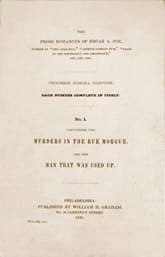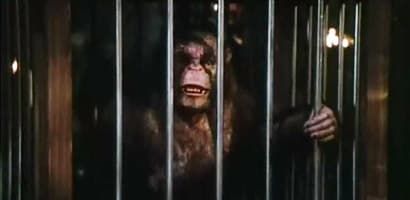The Murders in the Rue Morgue
Critique • Quotes • At the movies
 Pamphlet, The Prose Romances of Edgar A. Poe, 1843
Pamphlet, The Prose Romances of Edgar A. Poe, 1843The Murders in the Rue Morgue
First publication
1841 in Graham's Magazine
First book publication
1845 in collection Tales
Literature form
Story
Genres
Crime, mystery, horror
Writing language
English
Author's country
United States
Length
Approx. 15,000 words

The unsurprising villain gets put behind bars in 1986 film.
The first pet detective
The Murders in the Rue Morgue (1986): Television film, 100 minutes; director Jeannot Szwarc; writer David Epstein; featuring George C. Scott, Val Kilmer, Rebecca De Mornnay, Ian MacShane
Of the handful of adaptations of Edgar Allan Poe's seminal detective story, the 1986 TV film, The Murders in the Rue Morgue, is often called the best.
Certainly better than the 1932 Bela Lugosi horror film or the 1954 Karl Malden vehicle, neither of which had much connection to the Poe story apart from an ape and a couple of characters' surnames.
This 1986 German production doesn't seem made for TV, as it stars leading American film actors in a sumptuous setting that evokes Paris of the nineteenth century in rich detail. With its production values and warm colour, you could easily mistake it for one of the fondly recalled Hammer Studio horror and detective productions of the 1950s. (See The Curse of Frankenstein and The Hound of the Baskervilles).
The great George C. Scott is Poe's sleuth Auguste Dupin. In this version of "The Murders in the Rue Morgue", he is a retired and widowed inspector who pines for his old job and spends his enforced dotage playing chess with his daughter (Rebecca De Mornay) and anyone who visits—until he is drawn into action for one last great, grisly mystery.
A great deal of effort has gone into fleshing out the short story, changing and creating characters, as well as building entirely new subplots—one about Dupin's daughter's fiancé being arrested for the murders while another young man (Val Kilmer) obviously falls for her, and another about the rivalry between Dupin and the jealous police prefect (Ian MacShane before greater television and movie fame).
But in this case tinkering with a classic is not a bad thing. It's done well and involves us in a story that takes longer than the mere thirty minutes we could get from the original tale.
The basic locked room mystery is presented and the detective actually does some detecting (though perhaps not as intellectually as Poe would have it). Moreover, although the film is wonderfully dark and atmospheric, it resists the temptation to tip over into being a horror flick. The crime is indeed horrible but the emphasis is on solving the mystery, along with some personal issues, without adding further thrills and chills.
The actors make the most of a melodramatic script. Scott is a delight to watch as the curmudgeonly old detective and seems to delight in the role himself, though Kilmer beside him is rather dull and pallid, never really seeming to be anything other than Val Kilmer, rising star of American film.
The ending is somewhat of a letdown. To be fair, "The Murders in the Rue Morgue" offers an impossible challenge: anyone interested in seeing a film of this story likely already knows the strange identity of the killer, which might have shocked at one time.
Odd then that the film goes to such great lengths to protect us from this knowledge, even to try to heighten the suspense in ways that could only work on someone who does not guess the conclusion. When we do "discover" the truth, we're tempted to laugh at its ridiculousness.
And then the film is over so quickly, leaving loose ends dangling—almost as if someone had a sequel or a whole series in mind. That might have been enjoyable.
— Eric


